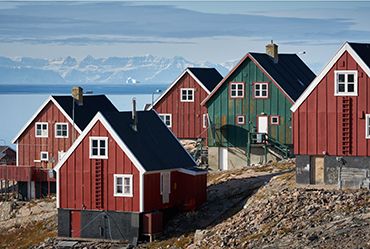Arctic voices
Grants from the Knowledge Exchange Seed Fund and the Public Engagement in Research Seed Fund enabled researchers from the School of Geography and the Environment to develop a podcast featuring indigenous Arctic peoples, fostering vital knowledge exchange about this fragile area.
 Photo credit: Joe Cornish
Photo credit: Joe Cornish‘It’s vital to include Arctic peoples in discussions about Arctic research and the future of the Arctic’, says project lead Sam Cornish. ‘Their lives and livelihoods are directly at stake, and they have generations of knowledge and experience to bring to the discussion. In the past, the relationship between indigenous communities and western researchers has tended to be extractive and insensitive, and it can be hard to facilitate productive, equitable knowledge exchange.’
'I already had some experience developing podcasts and know that they can help tell complex stories in a creative and compelling way. It’s also a great way to bring young people into the audience and allow people to access the discussion when and where it suits them, – which is why I decided to take this approach.'
The team worked with lawyer Charlotte Chamberlain, who specialises in human rights and environmental law in Canada, to identify potential speakers and conduct interviews – which were held over Zoom during 2022 with participants being paid for their time.
The first podcast (published March 2023) features a discussion with Oula-Antti Labba, a human rights lawyer fighting to protect Sámi communities, who speaks about how their traditional reindeer herding is under dual threat from climate change and, paradoxically, our attempt to address it. Warmer temperatures make it harder for reindeer to access food; mining for the minerals essential to develop renewable energy (such as copper) disrupts migratory corridors and pasture lands.
Economic geologists Anna Bidgood and Phil Rieger reveal that the area is uniquely positioned in Europe to supply the metals needed for the energy transition, but Oula-Antti says mining companies often don’t consult communities, leaving them to find out about new mineral exploration plans from public notices. Charlotte Chamberlain comments that, in theory, Sámi right to self-determination is protected under international law, but that in practice protection is weak.
While the podcast reveals the tensions that exist between protecting indigenous rights, sourcing minerals for the energy transition, and climate change, a central message is that there are ways to make progress towards Arctic sustainability. Baking international protocols into national laws can offer stronger protections; and mining companies can engage meaningfully with communities from the earliest stages to help all parties design acceptable solutions.
A second podcast explores the differences between western ideas of conservation and those of the indigenous Inuit communities of Alaska. The podcast features conservation biologist Victoria Qutuuq Buschman and is currently being edited. It will be available in summer 2023.
Sam Cornish comments: ‘My hope is that the podcasts will help people understand some of the complex issues affecting Arctic indigenous peoples, encourage Arctic researchers to work constructively with communities, and more broadly, contribute to a more socially and environmentally sensitive approach to mining and other industries in the Arctic.’
Sam continues: ‘It has been a huge privilege to work with the indigenous guests on the podcast. I feel grateful to have learned more about the significant challenges they face, and their unique expertise also helped me to see things in new ways.’
‘We’ll be promoting the podcasts over the coming months and I encourage anyone with an interest in indigenous rights, the Arctic or climate change to have a listen!’
Sam Cornish completed his DPhil in oceanography in 2021 and was the Coordinator of the Oxford University Polar Forum until September 2022. He is now a Climate Transition Plan Analyst for the Institutional Investors Group on Climate Change.
Project team
- Oula-Antti Labba, Saami Council (now Min. of Justice, Finland)
- Victoria Qutuuq Buschman, International Arctic Research Center, University of Alaska Fairbanks and Greenland Institute of Natural Resources
- Anna Bidgood and Phil Rieger, Irish Centre for Applied Geosciences (ICRAG), University College Dublin
- Charlotte Chamberlain, University of Oxford and Mitha Law Group
- Roberta Wilkinson, University of Oxford
Funders: KE Seed Fund, Public Engagement in Research Seed Fund.